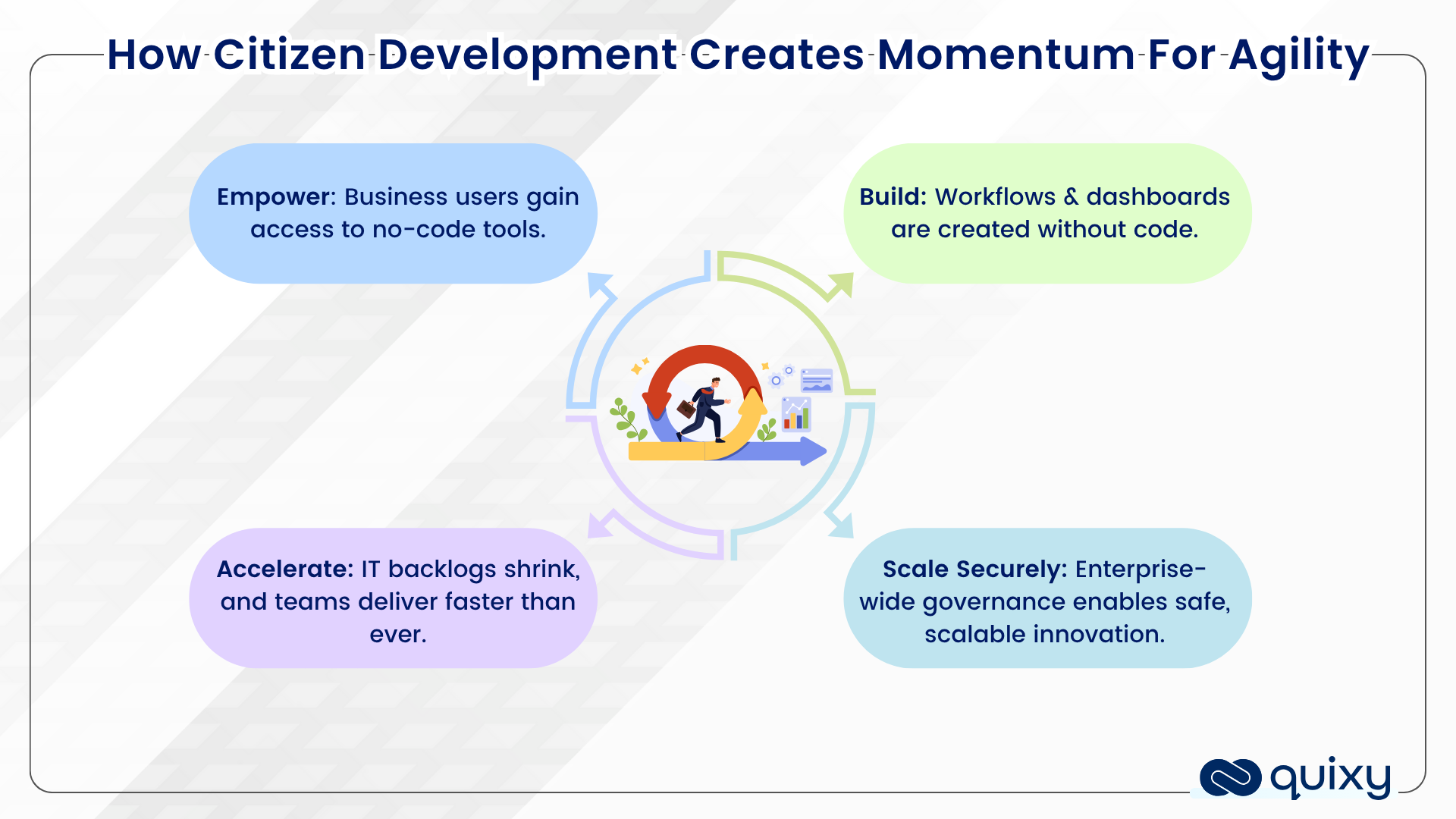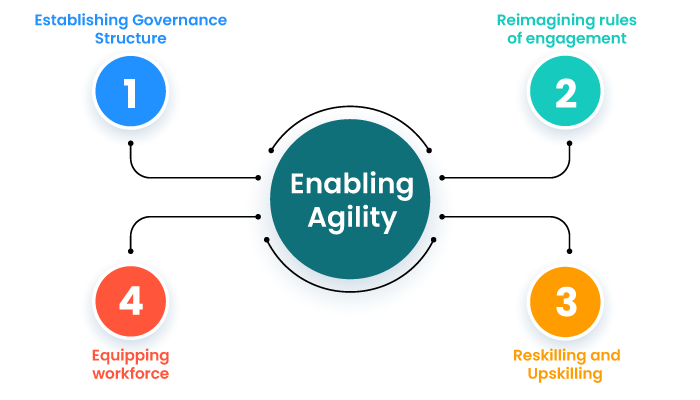
In 2026, agility won’t be just a competitive edge — it will be a survival strategy. Markets are shifting faster than ever, customer expectations are soaring, and traditional IT models are struggling to keep up. But there’s a quiet revolution happening inside forward-thinking organizations. Business users — once sidelined from software development — are now stepping into the spotlight as citizen developers, building the solutions they need, when they need them.
This shift isn’t about cutting corners — it’s about building smarter, faster, and with more resilience. As the demand for digital speed and flexibility grows, citizen development is becoming a cornerstone of the agile enterprise, empowering teams to adapt and respond in real time. As enterprises look for ways to evolve without adding IT overhead, citizen development is emerging as the secret weapon in unlocking true business agility. Here’s how.
On one hand, businesses are going full throttle on digitizing operations. On the other, IT talent shortages continue to hamper the timely rollout of complex systems. No-code low-code citizen development platforms are bridging this gap effectively.
These no-code low-code platforms simplify application development to the point where business users — or citizen developers — can build web and mobile solutions without knowing programming, APIs, or deployment. Delivered via SaaS or PaaS models, no-code solutions remove many technical barriers, enabling IT and business teams alike to become more agile and functionality-focused.
By embracing no-code tools, project managers can serve the diverse, often siloed interests of both IT and business — acting as a unifying force across departments.
So what are the real advantages of no-code development, and how can you embed it within your project teams?
The answer lies in empowering a network of citizen developers — non-technical team members who take on everyday development tasks that IT teams simply don’t have the bandwidth to handle.
According to Gartner, citizen developers will build 80% of all tech products by 2026. This surge is rooted in the post-COVID digital boom, where organizations raced to adopt cloud services and reimagine processes for a remote workforce. Combined with the rise of agile frameworks and ongoing developer scarcity, the stage is set for citizen developers to solve a growing range of business challenges.
What is the impact of citizen development?
As citizen development continues to grow, its impact is evident across a wide array of fields. Citizenship development initiatives typically include building automated business processes. Routine, repeatable, and rules-based automation are the guiding principles.
AI and machine learning tools with no-code or low-code have made it easier for business users to democratize AI through improved decision-making.
It is possible for enterprises to build AI and machine learning applications without any coding expertise. Low-Code and no-code platforms with simple drag-and-drop features allow data scientists to build machine-learning applications and lighten their workload. The platforms make it easy to build and train ML models, just as no-code and low-code development platforms help build software applications quickly without coding. You can also check out Citizen Developer’s Toolbox: Insights and Strategies from Our eBook-Innovate and Empower: A Journey through Citizen Development!
In general, some areas where citizen developers can prove to be of massive value for organizations are:
- Citizen development programs can support HR, Marketing, Supply Chain, Finance, IT help desk, and facilities management functions.
- It is possible for citizen developers to enhance corporate processes within apps or create better or more unified user interfaces for existing apps.
- A workflow automation system can automate end-to-end processes involving multiple systems or data sets.
How Citizen Development Fuels Agility in an Enterprise

As change accelerates across industries, organizations must quickly adapt to shifting customer needs, evolving regulations, and technological disruptions. Traditional software development, with its long cycles and heavy IT dependency, often becomes a bottleneck rather than a catalyst for change.
Enter citizen development—a game-changing movement that places innovation in the hands of business users. By equipping non-technical teams with no-code and low-code platforms, enterprises are unleashing a new wave of agility. These empowered users can build, iterate, and launch solutions rapidly, without the delays of conventional IT pipelines.
Citizen development isn’t just a workaround for IT bottlenecks. It’s a strategic lever, turning every employee into a problem-solver and every department into a hub of innovation. In a world that demands instant adaptability, citizen development is the key to becoming a truly agile enterprise.
Agility thrives on speed, responsiveness, and decentralization—areas where traditional IT-led approaches often fall short. Citizen development addresses this by empowering teams to respond instantly to changing business or market conditions. Instead of waiting weeks or months for an IT solution, departments can build and deploy their own applications in a matter of days.
Developers and architects may focus on more complicated solutions that offer real value to the business. It translates to higher overall productivity. The use of low-code/no-code automation can cut custom app development time by 50% to 90%.
This ability to act quickly fosters a culture of ownership and proactive problem-solving, which is crucial in a world where customer expectations evolve rapidly and internal demands fluctuate. Empowered teams mean faster iterations, quicker decisions, and fewer bureaucratic delays.
“Businesses that prioritize agility grow revenue 37% faster and generate 30% higher profits than their less agile peers.” – Accenture
By embedding agility at the grassroots level through citizen development, enterprises gain a powerful lever to outpace the competition.
Embracing no-code means adopting a philosophy that prioritizes user empowerment. However, it would help if you had a new software development life cycle that is flexible and built on agile principles to empower consumers. You also require a framework to assist citizen developers in rapidly developing applications and getting real-time feedback from stakeholders.
Also Read: What is Citizen Development: A Comprehensive Guide
Understanding citizen development is one thing, but understanding how to scale it is another. To successfully adopt and scale citizen development, your organization needs to:
- Establish a governance structure.
- Reimagine rules of engagement with IT departments and business users.
- Reskill and upskill your workforce with agile future competencies, including digital literacy and citizen development proficiency.
- Equip your workforce with the required no-code tools.
Discover your organization’s readiness for citizen development. Start your organizations’s CD assessment now!

Without the aforementioned considerations, citizen development applications may cause more harm than good, causing extra work or confusion instead of solving a problem. Your citizen development practitioners need tools to design and build their applications within the context of the business and the entire organization.
No-Code + Citizen Development: The Ultimate Agility Stack
No-code platforms are the technological backbone of citizen development. These platforms eliminate traditional development bottlenecks by offering intuitive drag-and-drop interfaces, visual workflows, pre-built integrations, and customizable templates that allow business users to turn ideas into functional apps with minimal IT involvement.
When paired with agile methodologies—such as iterative development, cross-functional collaboration, and continuous feedback—no-code platforms supercharge the process. Teams can roll out MVPs, test them in real-time, and refine them rapidly without lengthy development cycles or overburdening IT.
This combination creates a self-sustaining cycle of experimentation and improvement, where agility isn’t just a framework but an embedded capability.
Citizen development isn’t a one-time trend—it’s a continuous motion that powers the agile enterprise of tomorrow.
Breaking the Backlog: Citizen Developers to the Rescue
Backlogs are a persistent challenge in enterprise IT. With limited resources and ever-growing demands, IT teams often find themselves focusing only on mission-critical tasks, sidelining smaller (but still important) departmental needs.
More than 74% of IT leaders say that project backlogs prevent them from focusing on strategic initiatives.
Citizen developers offer a solution. By taking on use cases such as:
- Approval workflows
- Internal dashboards
- Performance tracking tools
- Form-based data collection systems
…they reduce the strain on IT and speed up internal innovation.
The result? Shorter lead times, faster delivery, and a more agile response to departmental needs.
Business Users at the Helm: The New Change Agents
Business users possess deep, contextual knowledge of their functions. They understand customer needs, operational pain points, and departmental workflows better than anyone. By giving them the tools to build, test, and iterate, organizations turn passive users into active contributors.
This empowerment fosters a mindset shift: from dependency on IT to co-ownership of solutions.
A McKinsey report found that organizations that democratize digital tools across functions are 1.5x more likely to outperform their peers on customer satisfaction and time-to-market.
Citizen developers bring innovation closer to the problem, ensuring solutions are timely, relevant, and impactful.
Driving Down Costs, Powering Up Productivity
Citizen development significantly reduces reliance on expensive third-party vendors and specialized development resources. Instead of allocating large budgets to outsourced builds, teams can develop internally at a fraction of the cost.
- Forrester’s Total Economic Impact study found that organizations using no-code platforms save up to $4.4 million annually.
Additionally, empowering more employees to solve their own challenges boosts organizational productivity and morale. Teams spend less time waiting and more time building.
Also Read: The Secrets of App Development: Building Excellence
Agile Frameworks + Citizen Development: A Perfect Match
Agile and citizen development go hand in hand. Agile promotes rapid iteration, cross-functional collaboration, and short feedback cycles. Citizen development complements this by enabling faster prototyping and real-time user involvement.
With no-code tools, even non-technical users can participate in agile sprints:
- Create wireframes and MVPs
- Test early versions with users
- Provide direct input on improvements
This breaks down silos between business and IT, helping organizations achieve enterprise-wide agility—not just within tech teams.
Overcoming Talent Shortages with Citizen Development
The global tech talent shortage is intensifying. Korn Ferry projects a shortfall of 85 million tech workers by 2030, which could result in $8.5 trillion in unrealized annual revenue.
Citizen development offers a scalable workaround. By enabling business teams to take charge of their digital needs, organizations reduce the pressure on hiring hard-to-find developers.
In other words, citizen development creates a parallel workforce for digital innovation, ensuring momentum even when IT resources are limited.
Watch Webinar: Accelerate your Agile Development Transformation with No-Code/Low-Code
Real-World Impact: Stats that Prove the Citizen Development Boom
Citizen development is transforming how organizations innovate and deliver solutions by empowering non-IT employees with low-code no-code (LCNC) tools. Below are the key impacts, supported by interlinked statistics and research:
1. Accelerated Solution Delivery
- 70% faster app development cycles compared to traditional methods, as reported by Forrester .
- 10x faster application creation with LCNC platforms, enabling prototypes in hours instead of weeks .
- 50–90% reduction in development time for custom apps through automation, per 451 Research .
2. Cost Efficiency
- 50% cost reduction in app development and maintenance (IDC).
- $4.4 million average business value generated over three years by avoiding additional IT hires .
- 70% savings per app (e.g., Cashere’s currency exchange app saved 70% using Progress Kinvey) .
3. IT Backlog Reduction
- 72% of IT leaders cite backlogs as a barrier to strategic work, alleviated by citizen development .
- 80% of organizations report reduced IT strain through citizen-led initiatives .
- 60% of custom apps now built outside IT departments, with 30% created by non-technical staff .
4. Workforce Empowerment
- 33% of engineers’ time reclaimed from technical debt management (Stripe) .
- Higher employee satisfaction as teams gain autonomy to solve problems quickly.
- 44% of workplace skills expected to shift by 2028, with citizen development bridging digital fluency gaps .
5. Market Growth and Adoption
- $187 billion projected LCNC market value by 2030, up from $10.3B in 2019 (31.1% CAGR) .
- 4x more citizen developers than professionals in large enterprises by end of the year .
- 80% of tech products/services will be built by non-IT professionals(Gartner) .
6. Innovation Democratization
- 33% higher innovation scores for organizations with citizen developers (McKinsey)
- 84% of enterprises adopt LCNC to involve business units in digital asset creation .
- 450M of 500M new apps by 2028 will be built on LCNC platforms (Microsoft)
Citizen development is not just a productivity tool but a strategic imperative, driving:
- Faster time-to-market (70% acceleration ).
- Cost savings (50% reduction [citation:User provided]).
- Scalable innovation (80% of tech built by non-IT staff ).
Quixy in Action: Powering Agility Through Citizen Development
For enterprises ready to embrace agility, Quixy offers a powerful no-code platform that brings citizen development to life. With its intuitive drag-and-drop interface, visual workflows, and seamless integrations, Quixy enables business users to build complex, enterprise-grade applications—without writing a single line of code.
Whether it’s automating approval workflows, streamlining data collection, or creating dashboards for real-time insights, Quixy helps reduce IT backlog and accelerates delivery across departments. Its governance-ready framework ensures that security, compliance, and version control are built-in—empowering teams to innovate confidently.
Quixy is already driving impact across industries. From public sector bodies digitizing processes in days to large enterprises deploying mission-critical apps in weeks, the platform proves that agility isn’t reserved for IT alone.
By putting technology in the hands of those closest to the problem, Quixy helps organizations stay adaptive, efficient, and future-ready—making it a true ally for any enterprise seeking to scale citizen development.
Conclusion
With the rise of citizen developers, the extent of democratization of software development is also rising, which is significantly facilitating agile application development. Citizen Development has the potential to be a game-changer for organizations looking to increase their agility. By empowering employees with the tools to build custom applications, organizations can save time, increase efficiency, and stay ahead of the competition. With low-code no-code technology reducing custom app development time by 50% to 90%, organizations can quickly and easily create the solutions they need to keep pace with the fast-changing business environment. Citizen Development holds the key to building truly agile future teams and now is the time to start embracing this transformative technology.
Agility will be defined not by how fast your IT team can code, but by how quickly your people can adapt. Citizen development transforms enterprises into agile, responsive, and empowered ecosystems. By embedding innovation into every function, organizations can respond to change faster, deliver better results, and unlock the full potential of their workforce.
Rather than being a workaround for IT delays, citizen development is becoming the default mode for modern, agile business.
As more companies adopt a hybrid workforce model, it’s critical to direct non-technical staff toward citizen development rather than burden remote-based IT personnel with day-to-day troubleshooting. No-Code platforms are democratizing and speeding up innovation by allowing business analysts, product designers, and marketers to act as citizen engineers.
Frequently Asked Questions
Here, we have answered some common questions about citizen development and how it can help organizations become more agile in the coming years.
What are the basic skills required for Citizen Developer?
Citizen developers require several skills, including a basic understanding of software development. Citizen developers should also understand security and compliance standards to ensure that their applications meet the necessary regulations. Finally, they must be willing to learn continuously and stay up-to-date with the latest technologies and trends in the industry.
What is the importance of Citizen Development?
Citizen development is important because it empowers non-technical individuals to create and deploy software solutions within their organizations. This approach to application development can help organizations become more agile by reducing the dependence on traditional IT departments and their often-lengthy development cycles.
With citizen development, business users can quickly create applications that meet their specific needs, enabling them to respond rapidly to changes in the market and stay ahead of the competition.
What are the key characteristics of a Citizen Developer?
The key characteristics of a citizen developer are as follows:
Business-oriented mindset: Citizen developers should have a business-oriented mindset, which means they understand the organization’s goals and objectives and how their applications can contribute to achieving them.
Basic technical skills: Citizen developers need basic technical skills, such as an understanding of programming languages, web development, and database management.
Problem-solving ability: Citizen developers should be able to analyze problems, identify potential solutions, and implement them.
Creativity and innovation: Citizen developers should be able to come up with new & innovative ideas for applications that can solve business problems.
Collaboration skills: Citizen developers should be able to work effectively with other team members, such as business analysts, IT professionals, and end-users.
Continuous learning: Citizen developers should be willing to learn continuously and stay up-to-date with the latest technologies and trends in the industry.
Understanding of security and compliance standards: Citizen developers should understand security and compliance standards to ensure that their applications meet the necessary regulations.
What is an example of citizen development?
An example of citizen development is when a business user creates a custom application using low-code or no-code development tools to solve a specific business problem. For instance, suppose a sales team wants a tool to manage their customer contacts more efficiently. In that case, a sales team member with basic technical skills could use a low-code platform to create a simple application that allows them to input and manage customer data.
This application could be developed and deployed quickly with Quixy, with little or no involvement from the IT department. The sales team could then use this tool to track customer interactions and improve sales performance. This is just one example of how citizen development can help organizations become more agile by empowering business users to create applications to meet their needs.
What is a Citizen Developer?
A citizen developer is a non-professional software developer who creates and deploys software applications using low-code or no-code development platforms. Citizen developers may have little or no formal training in software development but possess some basic technical skills and have a good understanding of their organization’s needs and goals. They use low-code or no-code development tools that allow them to create applications using visual interfaces and pre-built modules, making it easier for them to develop and deploy applications quickly without relying on traditional IT departments. Citizen developers can help organizations become more agile and responsive by creating custom applications that meet specific business needs quickly and efficiently.
Subscribe
Login
Please login to comment
0 Comments
Oldest















